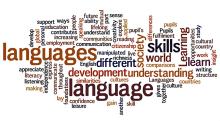By Elham Monfaredi
In the ever-evolving realm of language education, the integration of technology has become paramount, particularly for our students who belong to Generation Z—an age group fluent with technology. As our educational landscape continues to transform, it is essential to acknowledge and embrace the digital tools that resonate with our tech-savvy learners.
In this edition, our focus is on introducing accessible and free tech platforms tailored to the languages offered in our department—Arabic, Hebrew, Persian, and Turkish. Our aim is to empower both students and instructors with valuable tools that can enhance language learning and teaching experiences.
One resource that stands out in the realm of language learning is the Defense Language Institute Foreign Language Center (DLIFLC) website. Featuring an extensive selection of over 30 languages, including Arabic (Egyptian, Gulf, Iraqi, Levantine, MSA, and Sudanese), Hebrew, Persian (Farsi and Dari), and Turkish, DLIFLC offers tailored lessons for learners of varying proficiency levels. Accessible at https://gloss.dliflc.edu/, this platform allows users to customize their learning experience. Choose your language, proficiency level (1 to 4), modality (listening or reading), and competence (discourse, lexical, socio-cultural, structural). Delve into topics spanning culture, technology, and science. DLIFLC's lessons are freely accessible, providing feedback and informative notes on grammar, lexicon, and culture.
Lectia (Lectia language app from the National Foreign Language Center) offers free lessons in 19 languages including Arabic and Persian.
Persian language online (https://persianlanguageonline.com/) provides free, comprehensive lessons in video and audio formats across three levels: beginner, intermediate, and advanced. The engaging topics allow for self-study and self-assessment with quizzes at the end of each lesson, making it an excellent resource for enhancing listening, speaking, and vocabulary skills.
Hebrew Podcasts (Hebrew Podcasts Lessons by Level) provides easy, beginner, intermediate and advanced audio lessons in Modern Hebrew, focusing on building language skills. A few lessons are free, while most require a membership.
Teach me Hebrew (Teach Me Hebrew - Home) provides free grammar-focused audio and text lessons in Modern Hebrew for those who prefer self-study.
Aswaat cArabiyya (https://www.laits.utexas.edu/aswaat/) provides authentic listening materials and accompanying activities that are intended for the various levels of proficiency from Novice to Superior.
Khallina (https://khallina.org/) is an open source tool that helps teachers and independent learners of Arabic explore Arab culture. This website contains Cultural Modules suitable for all proficiency levels, on a variety of subject matters including: music, food, politics, humor, gender issues, and much more.
Quranic Arabic Corpus (https://corpus.quran.com/) is an annotated linguistic resource which shows the Arabic grammar, syntax and morphology for each word in the Holy Quran.
ArabiKey’s keyboard (https://arabikey.com/) is intended for computer users possessing a QWERTY or any other physical keyboard without Arabic letters displayed. The keyboard aims to allow you to write in the Arabic language while viewing the letters you press.
Learn Levantine Arabic (Learn Levantine Arabic) provides phrases and vocabulary grouped in situational or themed videos such as grocery store shopping, travel, animal names, and medical terms for doctors’ visits.
Sowt (https://www.sowt.com/en/podcast) includes free Arabic-language podcasts on a variety of topics for advanced learners of the language.
Arabic Without Walls (https://arabicwithoutwalls.ucdavis.edu/coursecontent.html) contains materials for three separate components broken down under the Course Content into Al-Kitaab, Interviews, and Culture. While each component may stand by itself and therefore may be studied independently, the three are designed to complement each other in Arabic Without Walls.
LingoHut (https://www.lingohut.com/en/l69/learn-arabic) simplifies the exploration of Arabic, offering 5-minute lessons to enhance vocabulary and pronunciation through engaging activities and voice recordings.
As language instructors, we consistently develop customized lessons for students. Here is a list of technology tools and online platforms for all languages, designed to enhance instructors' lessons by integrating technology.
- Canva (www.canva.com) is an online graphic design platform that offers an education feature. Students can create designs and documents, while teachers can develop lessons, worksheets, and templates in this visual communication and collaboration platform.
- Charlala (https://charlala.com/) is a teacher-created platform that offers a suite of speaking tools, including simulated conversations and digital whiteboards.
- Flip (https://info.flip.com/en-us.html), formerly Flipgrid, is a video discussion and video sharing app, that allows students to practice speaking skills through video recordings and engagement in language activities. Instructors use it to assess oral proficiency, provide feedback, and create interactive assignments.
- Hypothesis (https://web.hypothes.is/) is an online platform that can be used to annotate anything online with the class, a very convenient tool for improving reading skills. Hypothesis turns any piece of digital content into a collaborative learning experience, keeping students engaged and connected with social annotation.
- Jamboard (https://jamboard.google.com/) is a collaborative digital canvas developed by Google that fosters students collaboration in a shared space, serving as a versatile online whiteboard for interactive learning.
- Quizlet (https://quizlet.com/) is a vocabulary building platform that supports language learning through interactive tools like flashcards and study modes. It offers audio support, tracks progress, and enhances accessibility, making language education engaging. Mobile-friendly features and pre-made study sets contribute to flexible and efficient learning experiences.
- VoiceThread (https://voicethread.com/) is an online platform that can be used by instructors and students to create, share, and provide feedback on a variety of audio, video, and text content.
Worddio (https://worddio.com/) is a vocabulary building app with customizable auditory flashcards to help learners grow their vocabularies during self-study, and facilitate flipped lessons.
